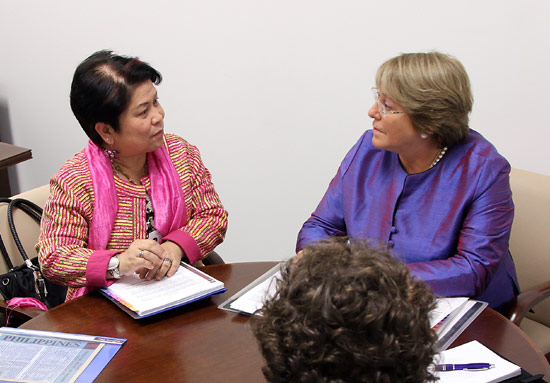Business Culture: Women in Business
The Philippines is a hierarchical society in which status is often determined by wealth, education, and skin color. Society is also heavily matriarchal for the most part, although there are variations among the many different ethnic groups scattered across the nation’s thousands of islands. The matriarchal nature of much of society has fostered a greater acceptance of gender equality, although women still have some significant hurdles to overcome before they can enjoy completely equal status with men. However, this is one country where women hold more high-level positions than men, including legislators, senior officials, and managers. However, urban women often fare better than rural ones in regard to equality.
Public Presence
In most areas of the Philippines, women tend to wear dresses, blouse and skirt combinations, or pants with a t-shirt. In some areas you will see women in shorts or short skirts accompanied by a top with spaghetti straps, but the majority of women wear pants or skirts that reach below the knees and a top that covers the shoulders, out of respect for the cultural values promulgated by the dominant Catholic church. In heavily Muslim areas, women often are covered from head to toe in clothing that hides their whole body with the exception of their hands and faces. As a visiting businesswoman, you might want to bring clothing that is primarily made of cotton or other material that “breathes,” since the country’s climate is very humid.
Although men and women mix feely in the country, and you will see couples and families walking together, it is more common to see small groups of the same gender moving about the market or in public places. While you can travel alone, it is advisable to travel around with at least one other person for safety reasons while in the Philippines.
Personal Interaction
People in the Philippines usually stand at least an arm’s length apart when conversing—farther if the two are strangers. A handshake is the most common form of physical greeting between a man and a woman, although it is usually the woman who must initiate it. Often acquaintances and even friends forego touch altogether and simply raise their eyebrows in greeting. Direct eye contact when talking to another person is customary for Filipinos, so be sure to make eye contact with your business partners. Avoid too much eye contact, however, as it is considered rude. When speaking with Filipino business partners, feel free to use the same tone and manner that you would with colleagues back at home.
For the most part, women in the Philippines are seen as people with their own ideas, opinions, and emotions. However, because of the wide variety of ethnic and religious groups within the country, the value placed on women's contributions is not always equal to that placed on a man's. Some Filipino men see women as equals; others see them as having significantly less value than men. Within the larger urban areas, though, women tend to receive greater respect than in some rural regions. In almost all areas, however, women are seen as the ones primarily responsible for nurturing children and caring for the home.
Autonomy and Leadership
Under the law, women have freedom of movement both within and outside of the country, can own their own businesses and property, and inherit equally with males. However, on average, women still earn less than men and hold fewer governmental positions. In general, you should have little trouble negotiating with your Filipino partners, signing a contract, or delegating responsibilities, as most Filipino men are familiar with women in positions of authority.
Article written for World Trade Press by John E. Roper.
Copyright © 1993—2025 World Trade Press. All rights reserved.

 Philippines
Philippines 
